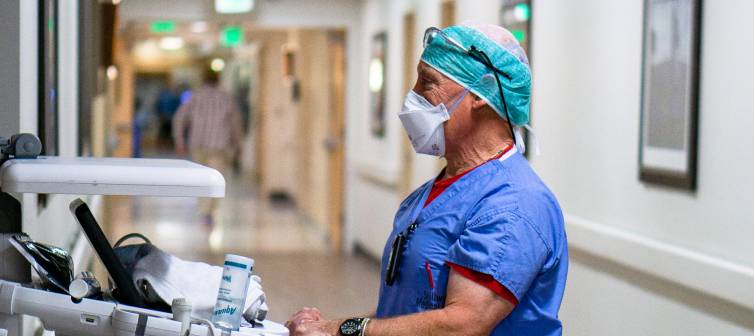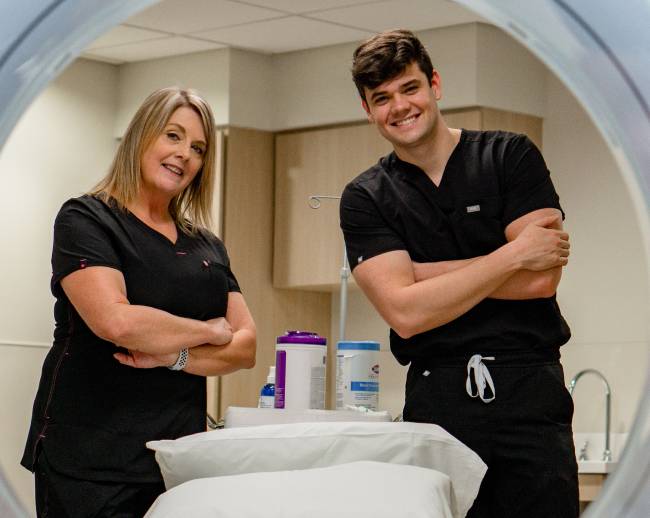- Find A Physician
- Services & Care
-
- Locations
-
-
- Search to find the location you need.
We’re here for you.Popular Searches

Stillwater Medical Center
-
1323 W. 6th Ave
Stillwater, OK 74074 -

Stillwater Urology Specialists
-
1201 S. Adams St.
Stillwater, OK 74074 -

OrthoOklahoma
-
511 S Windsor Dr
Stillwater, OK 74074 -
-
-
-
-
- Patients & Visitors
-
- Who We Are
Robotic Surgery
Advanced Robotic Surgery in Stillwater
Robotic-assisted surgery combines surgeon expertise with advanced technology to provide patients with personalized joint replacement plans and faster recovery times.
Chronic joint pain often limits your ability to work, play, and enjoy daily life in north-central Oklahoma. When conservative treatments stop working, Stillwater Medical offers a precise solution through advanced robotic surgery in Stillwater. Our surgical team uses state-of-the-art technology to restore your mobility and get you back to the activities you love.
Precision Technology for Knee Surgery and Replacements in Stillwater, Ok
Traditional joint procedures rely entirely on the surgeon’s manual alignment, but robotic assistance adds a layer of unparalleled accuracy. By using real-time data and 3D modeling, our surgeons customize every aspect of the procedure to your unique anatomy. This approach minimizes tissue damage and optimizes implant placement, which is critical for the long-term success of knee surgery and replacements in Stillwater.
Stillwater Medical Center provides surgical services using the latest and most trusted robotic-assisted technology. Our team of surgeons, nurses, and support professionals adhere to the latest standards of care, and depending on your procedure, that may include robotic surgery technology, like the daVinci 5 at our Stillwater, OK location.
Schedule Your Orthopedic Consultation Today
Choose a hospital that combines compassionate local care with world-class technology. Stillwater Medical’s robotic surgery services provides the expertise you need to regain your quality of life through safe, effective surgical intervention. Let our team help you move freely again.
Find a provider to discuss your surgical options.
Da Vinci 5 Surgical System
-
da Vinci 5 Surgical System
Stillwater Medical Center has invested in the latest surgical robot innovation. The da Vinci 5 Surgical System advances minimally invasive surgery for patients and surgeons like never before. The daVinci 5 at our Stillwater, OK clinic dramatically reduces recovery time and is only available in six other facilities in Oklahoma. Consult your doctor to see if our robotic surgery in Stillwater, OK is right for you.
Your Pathway to Better Mobility
The process begins with a consultation, where your surgeon determines if you are a candidate for a full knee replacement. If surgery is the right path, we schedule a series of X-rays to map your knee’s structure. On the day of the procedure, the surgeon guides the robotic assistant to perform precise bone cuts and implant positioning. This collaboration between human skill and robotic precision ensures optimal results for every knee surgery we perform in Stillwater.
Why Choose Stillwater Medical
Stillwater Medical consistently ranks as a Newsweek World’s Best Hospital, proving our commitment to delivering superior healthcare outcomes close to home.
- Our orthopedic team includes board-certified surgeons specifically trained in operating the ROSA Knee System and the daVinci 5, ensuring our Stillwater clinic patients receive expert care without traveling to urban centers.
- We have performed hundreds of successful joint procedures, establishing our facility as a regional leader for robotic surgery.
- From preoperative education to post-surgical rehabilitation, our integrated care team supports your recovery journey every step of the way.
You do not need to live with debilitating joint pain when advanced medical solutions are available right here in your community.
ROSA Knee System Overview
-
Robotic Technology for Knee Replacement
Understanding Robotic Technology for Total Knee Replacement
Our robotic knee surgery and replacement experts in Stillwater, OK and the surrounding areas will explain what makes the ROSA Knee System unique, what to expect preoperatively, what will happen with ROSA Knee during surgery, and what to expect after your surgery. -
Arthritis in the Knee Joint
The knee is a hinge joint formed by the tibia (shinbone), femur (thighbone), and patella (kneecap). The ends of the bones in the knee joint are covered with cartilage, a tough, lubricating tissue that helps cushion the bones during movement. Osteoarthritis, the most common form of arthritis, is a wear-and-tear condition that destroys joint cartilage and bone. It typically develops after years of constant motion and pressure in the joints. As the cartilage wears away, the joint becomes increasingly painful and difficult to move. If conservative treatment options fail to provide relief, your surgeon may recommend total knee replacement using ROSA Knee robotic technology.
-
ROSA Knee Robotic Technology
Getting a precise knee implant fit is important to your comfort and overall experience following knee replacement surgery. ROSA Knee uses data collected before and during surgery to inform your surgeon of many details related to your unique anatomy that may affect your implant fit. Using this data to make more informed decisions, your surgeon can plan for and carry out a personalized surgery based on your needs.
-
Before surgery
Your preoperative experience will be like most total knee patients. But, unlike traditional knee replacement methods, with ROSA Knee, a series of X-rays may be used to create a three-dimensional (3D) model of your knee anatomy. This 3D model will enable the surgeon to plan many specifics of your knee replacement before surgery.
-
During surgery
The surgical procedure using ROSA Knee is similar to traditional total knee replacement but with a robotic assistant. Your surgeon has been specially trained to use ROSA Knee in order to personalize the surgical approach for your unique anatomy. It’s important to understand that the robot does not operate independently. That means it does not move unless your surgeon prompts it to. Your surgeon is still in the operating room the entire time and making all the decisions throughout your surgery.
During your procedure, ROSA Knee utilizes a camera and optical trackers attached to your leg to know exactly where your knee is in space. Think of it like a detailed global positioning system (GPS) you might use in your car. The robot can tell and adjust if your leg moves even a fraction of an inch. This helps ensure that your surgeon’s plan is executed as intended. Throughout your surgery, ROSA Knee provides your surgeon with data about your knee. This information and your surgeon’s skill help them know how to position your implant based on your unique anatomy.
-
After surgery
Following surgery, you will be hospitalized based on your surgeon’s recovery plan. This hospitalization may range from one to three days. Recovery time varies, but most people should be able to drive after two weeks, garden after three to four weeks, and golf after six to eight weeks. Your surgeon will tell you when and what activities you can return to and avoid.
-
Complications
While uncommon, complications can occur during and after surgery. Some complications include but are not limited to, infection, blood clots, implant breakage, malalignment, and premature wear, which can require additional surgery. Although implant surgery is extremely successful in most cases, some patients still experience stiffness and pain. No implant will last forever, and factors such as post-surgery activities and weight can affect longevity. Be sure to discuss these and other risks with your surgeon.
There are many things that your surgeon may do to minimize the potential for complications. Your surgeon may have you see a medical physician before surgery to obtain tests. You may also need to have your dental work up-to-date and may be shown how to prepare your home to avoid falls. -
Summary
The decision to have surgery is sometimes difficult. We hope this information has helped you understand the ROSA Knee System so you can make the best decision for yourself. This information is not intended to replace the experience and counsel of your orthopedic surgeon. If you have any further questions, please speak with your orthopedic surgeon.
-
Important Note
This is intended to provide an overview of knee replacement surgery and should be reviewed with your doctor. It does not include all the information needed to determine eligibility for knee replacement or the proper use and care of artificial knee replacements. Please consult your surgeon for more information. Information may also be obtained by calling the toll-free number or visiting the website. The toll-free number can also be used to obtain complete product contraindications, warnings, precautions, and possible adverse effects. Individual results may vary. Your results will depend on your personal circumstances. How long a knee replacement will last varies from patient to patient. It depends on many factors, such as the patient’s physical condition, activity level, body weight, and surgical technique. Replacement joints are not as strong or durable as a natural, healthy joint, and there is no guarantee that an artificial joint will last the rest of a patient’s life. All knee replacements may need to be replaced at some point.
This device is available only on the order of a physician.
Location

Stillwater Medical Center
-
1323 W. 6th Ave
Stillwater, OK 74074 -
Had a Great Experience?
Tell Us About It!
"*" indicates required fields



